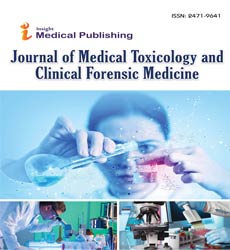Pediatric Poisonings: Challenges in Diagnosis and Treatment
Christopher Koch
Department of Toxicology, Touro College of New York, New York, United States
Published Date: 2023-06-12DOI10.36648/ 2471-641.9.2.53.
Christopher Koch*
Department of Toxicology, Touro College of New York, New York, United States
- *Corresponding Author:
- Christopher Koch
Department of Toxicology,
Touro College of New York, New York,
United States,
E-mail: Koch_c@tuc.edu
Received date: May 11, 2023, Manuscript No. IPJMTCM-23-17577; Editor assigned date: May 15, 2023, Pre QC No. IPJMTCM-23-17577 (PQ); Reviewed date: May 26, 2023, QC No. IPJMTCM-23-17577; Revised date: June 05, 2023, Manuscript No. IPJMTCM-23-17577(R); Published date: June 12, 2023, DOI: 10.36648/ 2471-641.9.2.53.
Citation: Koch C (2023) Pediatric Poisonings: Challenges in Diagnosis and Treatment. J Med Toxicol Clin Forensic: Vol.9 No.2:53.
Description
Pediatric poisonings pose significant challenges to healthcare professionals due to the unique vulnerabilities of children and the wide range of toxic substances they may encounter. Accidental ingestion of household chemicals, medications, plants, or illicit drugs can lead to severe health consequences in young children. Prompt and accurate diagnosis, followed by appropriate treatment, is essential to ensure positive outcomes and prevent long-term complications. Limited Communication Skills: Young children may not be able to communicate their symptoms or the substances they have ingested effectively. This can hinder the diagnostic process, requiring healthcare providers to rely on physical examination, observation, and information from parents or caregivers. The early symptoms of poisoning in children can be nonspecific and easily mistaken for common childhood illnesses. These may include nausea, vomiting, diarrhea, lethargy, and irritability. Identifying poisoning as the underlying cause requires a high index of suspicion and a thorough evaluation. Some poisonings can present with symptoms similar to those of common childhood illnesses, such as viral infections or gastroenteritis. This similarity can delay diagnosis and appropriate treatment. In certain cases, the symptoms of poisoning may not manifest immediately after ingestion. This delayed onset can make it challenging to link the symptoms to a specific toxic exposure. Not all healthcare facilities have access to specialized toxicology services or laboratories that can quickly identify the ingested substance. This limitation can hinder the timely diagnosis of pediatric poisonings. Treating pediatric poisonings requires careful consideration of weight-based dosing for medications and antidotes. Incorrect dosing can lead to adverse effects or inadequate treatment. Some antidotes are not readily available in all healthcare settings, necessitating transfer to specialized facilities for appropriate management. Children may respond differently to toxic substances compared to adults due to differences in metabolism and physiology. As a result, the response to treatment can be unpredictable, requiring close monitoring and individualized care. In many cases, children may not have a complete medical history available, making it challenging to assess potential drug interactions or underlying medical conditions that could impact treatment decisions.
Use of Antidotes
Preventing pediatric poisonings is a critical aspect of ensuring child safety. Childproofing the Home: Keeping toxic substances, cleaning products, medications, and chemicals out of the reach of children and locked away in secure cabinets. Storing medications in child-resistant containers and educating parents about safe medication administration. Providing education and awareness to parents, caregivers, and guardians about potential hazards and how to respond in case of accidental ingestion. Encouraging caregivers to keep poison control hotlines easily accessible in case of emergencies. Pediatric poisonings present unique diagnostic and treatment challenges, requiring a careful and vigilant approach from healthcare professionals. Rapid and accurate identification of the ingested substance, along with weight-based dosing and appropriate use of antidotes, is essential to ensure favorable outcomes. By focusing on prevention strategies, raising awareness, and providing education to caregivers, the number of pediatric poisonings can be significantly reduced, safeguarding the health and well-being of children.
Unused Medications
Pediatric poisoning refers to accidental or intentional ingestion, inhalation, or contact with toxic substances by children. This is a serious and potentially life-threatening medical emergency that requires immediate attention and intervention. Young children, especially those between the ages of 1 and 4, are particularly susceptible to unintentional poisonings due to their curiosity and tendency to explore their surroundings by putting objects in their mouths. Cleaning products, pesticides, bleach, and other household chemicals can be toxic if ingested or inhaled by children. Prescription and overthe- counter medications, including vitamins and supplements, can be harmful if taken in excessive amounts by children. Certain plants, both indoor and outdoor, can be poisonous if ingested by children. Items such as batteries, glues, paints, and lighter fluid can be dangerous if ingested or inhaled. Cosmetics, perfumes, and lotions can contain toxic substances harmful to children if swallowed. Certain substances found in the environment, such as lead and mercury, can pose health risks to children if ingested or inhaled. The symptoms of pediatric poisoning can vary depending on the type and amount of the toxic substance ingested. If pediatric poisoning is suspected, immediate medical attention should be sought. Diagnosis involves a thorough medical history, physical examination, and information from parents or caregivers regarding the substance involved. Laboratory tests may be conducted to identify the specific toxic substance in some cases. Treatment will depend on the type of poison ingested and the severity of the poisoning. In some cases, activated charcoal may be administered to help absorb the poison and prevent further absorption. Antidotes may be used for specific types of poisonings. Supportive care, such as maintaining the child's airway, providing oxygen, and administering intravenous fluids, may be necessary in severe cases. Preventing pediatric poisoning is essential to keep children safe. Store Keep medications out of reach of children and store them in child-resistant containers. Store household chemicals, cleaning products, and other hazardous substances in locked cabinets or high shelves. Safely dispose of old or unused medications to prevent accidental ingestion. Teach children about the dangers of consuming unknown substances and discourage them from putting non-food items in their mouths. Install safety latches on cabinets, use safety gates, and secure cords and blinds to reduce access to potential hazards. Keep the phone number of the poison control center or emergency services easily accessible in case of an emergency. Pediatric poisoning is a serious and preventable health risk that requires vigilance from parents, caregivers, and healthcare professionals. By taking proactive measures to secure and properly store toxic substances, educating children about the dangers of ingesting unknown substances, and being aware of potential hazards in the home environment, we can significantly reduce the incidence of pediatric poisonings and protect the well-being of our children. In the event of a suspected poisoning, seeking immediate medical attention is crucial for a successful and timely intervention.

Open Access Journals
- Aquaculture & Veterinary Science
- Chemistry & Chemical Sciences
- Clinical Sciences
- Engineering
- General Science
- Genetics & Molecular Biology
- Health Care & Nursing
- Immunology & Microbiology
- Materials Science
- Mathematics & Physics
- Medical Sciences
- Neurology & Psychiatry
- Oncology & Cancer Science
- Pharmaceutical Sciences
